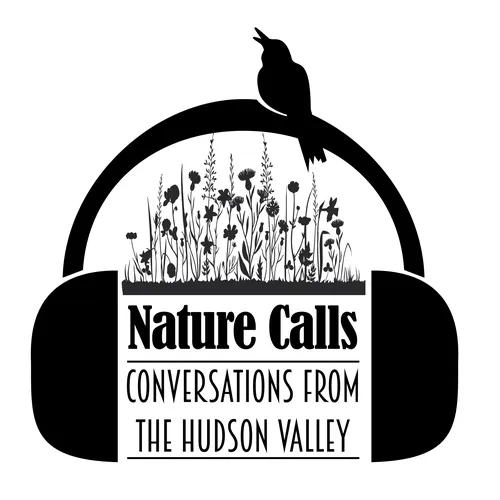
Nature Calls: Conversations from the Hudson Valley
Join CCE Master Gardeners’ conversations about all aspects of gardening, ecology, and nature. This weekly podcast is designed to entertain, inspire, educate and inform listeners who want to begin or enhance their gardening journey and/or explore other aspects of the Hudson Valley’s natural resources.
- Update frequency
- every 7 days
- Average duration
- 27 minutes
- Episodes
- 189
- Years Active
- 2022 - 2025

Episode 149: Forest Ecology
Dr. Charles Canham and Dr. Clive Jones rejoin Nature Calls: Conversations from the Hudson Valley in a discussion about Forest Ecology. Charles Canham is senior scientist at the Cary Institute of Ecos…

Episode 148: Spongy Moths
The spongy moth (lymantria dispar) is a non-native, foliage eating insect that threatens deciduous trees and impacts humans. It is considered one of the 100 most destructive invasive species worldwid…

Episode 147: Hunting and Fishing
In New York State, the Department of Environmental Conservation (DEC) has regulatory and enforcement authority for Environmental Conservation Law, including two law enforcement divisions, as well as …

Episode 146: Hits and Myths Retrospective (Part 3)
Have you heard the adage that the month of March comes in like a lion and goes out like a lamb? Is there any truth to this? Devon Russ, Master Gardener Volunteer, returns to explore the cultural orig…

Episode 145: Hits and Myths Retrospective (Part 2)
Part 2 of the Hits and Myths Retrospective focuses on some additional popular nature and gardening myths. In this episode, listen to three short segments of previously aired information on Nature Cal…

Episode 144: Hits and Myths Retrospective (Part 1)
According to the Merriam Webster dictionary, a myth is a popular belief or tradition that has grown up around something or someone. There are lots of myths associated with nature and gardening. A pop…

Episode 143: Kaatscast with Brett Barry
We, at Nature Calls: Conversations from the Hudson Valley, appreciate all of our listeners. Thank you for your support, feedback, and encouragement!
That said, everyone once in a while, we recognize …

Episode 142: Indigenous People
Justin Wexler returns to Nature Calls: Conversations from the Hudson Valley to share his vast wealth of knowledge about the Indigenous People who used to inhabit the Catskill Mountains and the surrou…

Episode 141: Mushrooms (Part 2)
John Michelotti rejoins the Nature Calls: Conversations from the Hudson Valley podcast to continue his mission to spread information about the incredible benefits of fungi, and their capacity to chan…

Episode 140: Mushrooms (Part 1)
A fungus is any member of the group of organisms that includes microorganisms such as yeasts and molds, as well as mushrooms. Fungi, like animals, acquire their food by absorbing dissolved molecules,…

Episode 139: Wines of the Hudson Valley
Wine is an alcoholic drink made from fermented fruit. Yeast consumes the sugar in the fruit and converts it to ethanol and carbon dioxide, releasing heat in the process. Wine is most often made from …

Episode 138: Patch to Plate Retrospective (Part 3)
Annie Scibienski is back with another Patch to Plate Retrospective episode. Once again, she talks about a variety of ways to prepare ingredients from your home garden or your local farmer’s market in…

Episode 137: Patch to Plate Retrospective (Part 2)
In Part 2 of our Patch to Plate Retrospective series, Annie Scibienski is back with four previously aired short segments all about using ingredients from your home garden in your home kitchen. This t…

Episode 136: Patch to Plate Retrospective (Part 1)
It’s harvest time and also time for some more retrospective episodes. These are a series of previously aired short segments on a common subject that have been packaged together for easier listening. …

Episode 135: Nutrition
At the most basic level, nutrition is about eating a regular, balanced diet. Good nutrition helps fuel your body. The foods you eat supply the nutrients your body needs to maintain your brain, muscle…

Episode 134: Ravensbeard Wildlife Center
Ravensbeard Wildlife Center is located in Saugerties, New York. The center is a non-profit (501(c)3) organization that provides wildlife rehabilitation for injured, ill and orphaned animals in order …

Episdoe 133: Ecological Gardening
An ecological garden is a thoughtfully designed space that is harmoniously integrated with the surrounding environment. Ecological gardening is a sustainable approach focused on understanding and enh…

Episode 132: The Art of Rocks
Rocks are any naturally occurring solid mass or aggregate of minerals. There are three major types of rock:
- igneous which are formed through the cooling of lava
- sedimentary which are formed by the ac…

Episode 131: Roses
Dr. Abbey Cash is in her 20th year as a Master Gardener Volunteer and has a passion for growing Roses in Columbia County. Trained as an educator, having taught in elementary, and at the college level…

Episode 130: Good Plant/Bad Plant Retrospective (Part 3)
Tim Kennelty returns with Part 3 of his Good Plant/Bad Plant Retrospective. In this episode he continues with a wealth of information about native plants that are beneficial to the environment, as we…